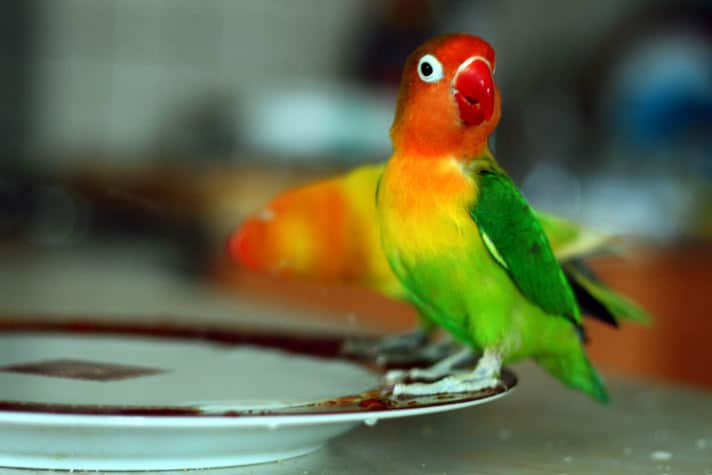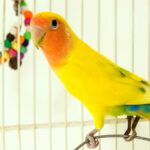All About Lovebirds

Photo by Peter Békési/Flickr
A half-shredded palm leaf toy, a pile of feathers and a layer of paper strips are all bundled up in the corner of the cage, and standing atop the mess is a peach-faced lovebird, nibbling a paper strip in her beak. She’s building a nest: an elaborate pad to which she’s been carry strips of paper and palm to all day.
A Fischer’s lovebird takes bits of corn husk, cat tails, honeysuckle and weeping willow leaves and drags them into a nest box, where she will spend days weaving them into a little tunnel to lay her eggs. A masked lovebird does the same, diligently working away at her nest, similar to the Fischer’s, but adding a little pad before the tunnel.
What makes these birds so unique? They’re all lovebirds, but three different species of lovebirds. It’s their differences that make them so unique.
The Three Lovebirds
Peach-faced lovebirds, masked lovebirds and Fischer’s lovebirds are very common in aviculture and readily available as pet birds. Despite their popularity, lovebirds have many negative myths surrounding them. The most common myth is that they have to be kept in pairs, otherwise they will die. No myth has been propagated as much as that one, and those who have even the faintest knowledge of pet birds have heard it.
In fact, most breeders and lovebird owners insist that lovebirds be kept as single pets, with owners being the lovebird’s flock. Introducing another lovebird at a later date can be dangerous, as the older lovebird might kill the new bird. Lee Horton, owner of Agapornis Acres said that lovebirds kept in groups should be introduced when they are very young. Carla White, a lovebird breeder in Illinois, said groups of lovebirds create social hierarchies, where there is one alpha bird and every bird follows that one. But as pets, she suggests only keeping one lovebird. “If you have more than one, it would still want to bond with one of its own kind rather than you,” said White.
The other common myth is that lovebirds are mean, most likely due to the female’s notorious aggression to what she perceives as her territory (i.e. the cage). New owners can be surprised when their lovable, adorable, sweet baby (and boy, are they sweet) suddenly turns into a little monster, chirping madly at them when their fingers dare enter the cage. Breeders will agree that the male of the species makes the better pet, but even males can show territorial behavior and, like any parrot, can learn that a bite gets results.
The three most popular species of lovebirds share many similar traits, as well as some surprising differences. Lovebirds are playful, active, adventurous and seem to live to play. They like to explore new places (tentatively at first, until they’re sure there’s no danger), and they love their toys. Big or small, a toy that can be chewed, thrown around the cage or beaten up is fair game to a lovebird. Owners love to talk about how their lovebirds love hiding in their pockets. Some owners teach their lovebirds a variety of tricks.
Peach-Faced Lovebird
These little birds are well known and seem to be the lovebird that is most commonly kept as a pet. Standing at 5-inches tall, the peach-faced lovebird is a green bird, with an expanse of blue along its rump and a rosy-colored face. It has a light tan-colored beak, and baby birds have black on their beaks until they are around 8-weeks old.
Peach-faced lovebirds have been bred into hundreds of color mutations, ranging in color from pure white (albino) to a deep purple (violet mutation). Carla White, a lovebird breeder in Chicago, has found people don’t recognize lovebirds when they are not the nominate green color and are often surprised to learn it is a peach-faced lovebird. The color, especially if its a rare color, can determine the price of a lovebird. Generally, the peach-faced mutations retain their light tan-colored beak (with a few exceptions, such as the violet mutation).
Peach-faced lovebirds have a very unique nesting behavior. The female chews pieces of paper, or other material, into even strips and then tucks them into her rump feathers and carries them to a perceived nest area. This can be anywhere: a hut, a seed cup or a corner of a cage.
Males might try to chew up strips of paper, but they lack the skills to make even strips to the ability the females can. When breeding, the male feeds the female as she sits on the egg, but the female also moves in and out of the nest.
Fischer’s Lovebirds
Fischer’s lovebirds fall into a group known as the eye-ring lovebirds, attributed to the white ring around their eyes. They are smaller than the peach face and masked lovebirds, and have a distinct, high-pitched chirp.
Fischer’s, in their nominate color, have a bright reddish-orange beak, an orange face and chest, and its lower body and wings are green. There are a few Fischer’s lovebird mutations, including blue (which looks like a blue-mutation masked lovebird), the dilute lovebird, and more.
While breeders agree that Fischer’s are more aggressive than the peach-faced lovebirds, they differ on their temperament. White said her Fischer’s lovebirds were always very sensitive, and when breeding, would abandon the nest if she tried to check on the babies. “I’ve found they liked their privacy, and were a tad more skittish,” said White.
But Wendy Edwards, of Carolina Flight Aviary and editor for the African Lovebird Society, said she has found the opposite with the birds. “Fischer’s and masked lovebirds, are calm, laid back and not as loud [as peach faces].
In Horton’s experience, Fischer’s lovebirds are by far the most aggressive of the three lovebirds.
When building nests, Fischer’s lovebirds will drag nesting materials into their nest box, where the female will sit and carefully weave her tunnel-like nest.
Masked Lovebirds
Masked lovebirds (sometimes incorrectly referred to as black-masked lovebirds) are in the eye-ring group, as well. The nominate color of the masked lovebird is a black mask, an orange beak, yellow chest feathers and green wings, tail and lower body.
There are a few mutations of masked lovebirds, one of the most popular being the blue-mutation masked lovebird. A mutation seems to lose its reddish-orange beak and is replaced with an almost pale peach-colored beakWhite said, in her experience, she’s found that masked lovebirds are far more aggressive than the other lovebirds. “Back in the day, I used to tell people that male masked lovebirds were usually difficult to find,” White said. In her experience, male masked lovebirds were really hard to find [around 30 years ago], due to their high mortality rate as chicks and from aggressive females.
Horton said that masked lovebirds build elaborate nests, where they make a pad and then a tunnel, where the female lays her eggs. They don’t build as elaborate a nest as the Fischer’s lovebirds.
Lovebird Differences and Similarities
Knowing a lovebird’s behavior, including breeding behavior, helps owners know the signs of a nesting or a territorial lovebird. Have your lovebird DNA-sexed, to determine if it is male or female. If you have a male, most people will say it makes a better pet of the two genders. Yet, even males can show aggressive behavior (but nowhere near on the scale of females). Females, on the other hand, can be aggressive, territorial and prone to excessive egg laying.
If your female lovebird starts trying to nest, keep her busy with non-shreddable toys, such as bells or balls. Keep her away from dark areas and monitor her to ensure she doesn’t become egg-bound (where the egg becomes trapped in the vent). Take your lovebird to an avian veterinarian immediately if you suspect she might be egg bound.
Work with your lovebird daily, and train it to step onto a hand-held perch for when you need to remove it from the cage. Taking the lovebird away from the cage can reduce territorial behavior.
There might be differences between the lovebirds, but owners know that, with a lovebird, they can have a fun-loving, playful pet bird if they take the time to socialize their bird and learn how to stop broody behavior in its tracks.
Want to read more about birds? Check out:



